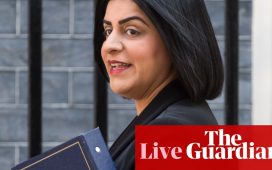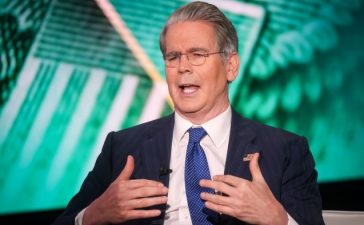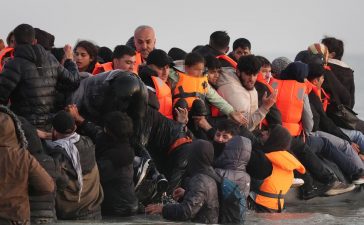PMQs – snap verdict
In his memoir Politics on the Edge, the former cabinet minister turned podcaster Rory Stewart says: “Nine years in politics had been a shocking education in lack of seriousness.” PMQs often shows why this is such a compelling critique of Westminster, but rarely more than today.
It’s the last PMQs before Christmas, and so an element of end-of-term cheer was understandable, and expected. But the opening of the sesssion today was just bizarre. First, Rishi Sunak was cheered to the rafters by his MPs as if he were Churchill at the end of WW2, rather than a PM who just managed to win a vote by postponing the big policy argument until the start of the next year. Then, after a question about contaminated blood, he took a question from a Tory who seemed to think that the reason the tax burden is so high was all because of the economic modelling methodology used by the OBR. Sunak leant into this enthusiastically, and started boasting about introducing the biggest tax cuts for a generation. Regular readers – and, indeed, any half-intelligent person who follows current affairs reasonably diligently – will of course know that the tax burden is approaching a post-war high.
Keir Starmer did not indulge Sunak’s denialism, but he did start off in festive, jokey mode and made some reasonably good gags about Tory disunity. This created a problem when, in his third question, he moved on to problems with the economy and public services. Sunak was able to hit back effectively with the line: “He talks about governing and he spent the first two questions talking about political tittle tattle, what a joke.”
But then Starmer then steered the conversation to homelessness, and he had a good jibe about the pomposity of the European Research Group.
Nearly 140,000 children are going to be homeless this Christmas, that is more than ever before, that is a shocking state of affairs and it should shame this government. Instead of more social housing, house building is set to collapse. Instead of banning no fault evictions, thousands of families are at risk of homelessness. Rather than indulge in his backbenchers swanning around in their factions and their star chambers pretending to be members of the Mafia, when is he going to get a grip and focus on the country?
Sunak’s response was managerial (“tone-deaf”, Starmer called it), but it was in the next exchange where he came unstuck. A good rule in the Commons is that a reply should always match the tone of the question put, which means that sombre/emotive/non-partisan needs a response in kind. Starmer started talking about named families and individuals affected by homelessness and asked Sunak about an 11-year-old boy whose letter to Santa requested a forever home, and no new toys, “just my old toys out of storage”. It was heart-breaking. There was no easy reply available to Sunak, but he should at least shown he could have engaged emotionally. Instead, he just started hammering away about a vote in the Lords. This time he really was tone-deaf.
Here is the clip.
“140,000 children homeless this Christmas, [PM] is utterly tone deaf” Labour leader Keir Starmer shares the story of a boy who asked Santa for a “forever home”
Rishi Sunak calls this “shameless opportunism” as Starmer “blocked” building of new homes
PMQs https://t.co/qhBEoVhkfV pic.twitter.com/zBSkhY0CpE
— BBC Politics (@BBCPolitics) December 13, 2023
It was hard to tell whether the trap was deliberate, or fortuitous – but Sunak fell into it all the same.
Key events
Sunak says ‘transitional arrangements’ will help people affected by new £38,700 earnings threshold for family visas
Many families were shocked last week when the government announced a huge increase in the income threshold for anyone sponsoring a family visa. The new rules should mean that any Briton earning less than £38,700 will probably not be allowed to bring a foreign spouse to the UK.
During PMQs Stephen Timms, the Labour MP who chairs the work and pensions committee, said the marriage plans of thousands of couples were scuppered by these rules. He asked if families already in the UK would be exempt when their visas were renewed, or whether any transitional exemptions might be in place.
In his reply, Rishi Sunak implied the rules would be introduced gradually. He said:
We have a long-standing principle that anyone bringing dependants to the UK must be able to support them financially – we should not expect this to be at the taxpayer’s expense and the threshold hasn’t been raised in over a decade, it is right that we have now brought it in line with the median salary.
The family immigration route as he knows does contain provision for exceptional circumstances, but more generally it’s also right, and I can tell him, to look at transitional arrangements to ensure that they are fair and the Home Office are actively looking at this and will set out further information shortly.
PMQs – snap verdict
In his memoir Politics on the Edge, the former cabinet minister turned podcaster Rory Stewart says: “Nine years in politics had been a shocking education in lack of seriousness.” PMQs often shows why this is such a compelling critique of Westminster, but rarely more than today.
It’s the last PMQs before Christmas, and so an element of end-of-term cheer was understandable, and expected. But the opening of the sesssion today was just bizarre. First, Rishi Sunak was cheered to the rafters by his MPs as if he were Churchill at the end of WW2, rather than a PM who just managed to win a vote by postponing the big policy argument until the start of the next year. Then, after a question about contaminated blood, he took a question from a Tory who seemed to think that the reason the tax burden is so high was all because of the economic modelling methodology used by the OBR. Sunak leant into this enthusiastically, and started boasting about introducing the biggest tax cuts for a generation. Regular readers – and, indeed, any half-intelligent person who follows current affairs reasonably diligently – will of course know that the tax burden is approaching a post-war high.
Keir Starmer did not indulge Sunak’s denialism, but he did start off in festive, jokey mode and made some reasonably good gags about Tory disunity. This created a problem when, in his third question, he moved on to problems with the economy and public services. Sunak was able to hit back effectively with the line: “He talks about governing and he spent the first two questions talking about political tittle tattle, what a joke.”
But then Starmer then steered the conversation to homelessness, and he had a good jibe about the pomposity of the European Research Group.
Nearly 140,000 children are going to be homeless this Christmas, that is more than ever before, that is a shocking state of affairs and it should shame this government. Instead of more social housing, house building is set to collapse. Instead of banning no fault evictions, thousands of families are at risk of homelessness. Rather than indulge in his backbenchers swanning around in their factions and their star chambers pretending to be members of the Mafia, when is he going to get a grip and focus on the country?
Sunak’s response was managerial (“tone-deaf”, Starmer called it), but it was in the next exchange where he came unstuck. A good rule in the Commons is that a reply should always match the tone of the question put, which means that sombre/emotive/non-partisan needs a response in kind. Starmer started talking about named families and individuals affected by homelessness and asked Sunak about an 11-year-old boy whose letter to Santa requested a forever home, and no new toys, “just my old toys out of storage”. It was heart-breaking. There was no easy reply available to Sunak, but he should at least shown he could have engaged emotionally. Instead, he just started hammering away about a vote in the Lords. This time he really was tone-deaf.
Here is the clip.
“140,000 children homeless this Christmas, [PM] is utterly tone deaf” Labour leader Keir Starmer shares the story of a boy who asked Santa for a “forever home”
Rishi Sunak calls this “shameless opportunism” as Starmer “blocked” building of new homes
PMQs https://t.co/qhBEoVhkfV pic.twitter.com/zBSkhY0CpE
— BBC Politics (@BBCPolitics) December 13, 2023
It was hard to tell whether the trap was deliberate, or fortuitous – but Sunak fell into it all the same.
Chris Bryant (Lab) asks what’s worse: losing WhatsApp messages as a tech bro; losing £11bn to fraud as chancellor; presiding over the biggest fall in living standards; or desperately clinging to power when your time is up?
Sunak says he is delivering for the British people.
Daniel Kawczynski (Con) asks for money to help tackle flooding by the River Severn.
Sunak says the government will consider this.
Mary Glindon (Lab) says the Home Office has put out a contract to manage small boat arrivals until 2030. Doesn’t that show even the Home Office does not think the Rwanda plan will work.
Sunak says that is a mischaracterisation of what is happening.
John Spellar (Lab) says people think Britain isn’t working. When will Sunak get a grip?
Sunak says the cost of living is the most pressing issue for families, and the government has halved inflation. And it is cutting taxes too, he says.
James Morris (Con) says the Tories made a manifesto commitment in 2017 and 2019 to reform the Mental Health Act. People with autism are being kept in inappropriate accommodation for long periods, he says. There was no bill in the king’s speech. So will the PM meet MPs to discuss?
Sunak says the government does want to bring forward a bill when time allows.
Marsha de Cordova (Lab) asks about families who are cold and hungry at Christmas
Sunak says the government cares deeply about poor families. He lists some of the welfare measures put in place.
Jerome Mayhew (Con) asks Sunak if he agrees that a dentist who accepts NHS funding should continue with the NHS before going private.
Sunak says he agrees. A dentistry recovery plan will be published in due course.
Cat Smith (Lab) says a rogue company has walked away from hazardous waste in Lancaster. The council has had to pick up the tab for dealing with this. It could burn for months. Will the government help it?
Sunak says Lancaster city council and other bodies are dealing with this. He will ensure that the relevant minister understands the urgency of this, he says.
Sunak says he’s willing to legislate to address DUP concerns about operation of Northern Ireland protocol
Sir Jeffrey Donaldson, the DUP leader at Westminster, asks if the government will amend the Internal Market Act to guarantee Northern Ireland has full access to the British market.
Sunak says he accepts more needs to be done. He says the government is ready to legislate to protect Northern Ireland’s place in the UK internal market, alongside moves to restore power sharing at Stormont.
This implies a deal is close to changing the way the Northern Ireland protocol works, to address DUP concerns and get it to lift its boycott of Stormont. Whether this would involve significant changes to trading rules, or just cosmetic ones, is not clear from these exchanges.
Neil Hudson (Con) asks about youth travel. Will the government mandate councils to provide post-16 transport for students who need to travel to college?
Sunak says no child should be prevented from accessing education by lack of transport.
Stephen Flynn, the SNP leader at Westminster, asks Sunak what his message is for children in Gaza.
Sunak says no one wants to see the fighting go on. He says he wants a sustainable ceasefire, which would not allow Hamas to continue bombing Israel.
Flynn says it is shameful that the UK abstained in the UN vote, and why the 153 nations calling for a ceasefire were wrong.
Sunak says too many people have lost their lives. He says he has made this point to the Israeli PM.
Stephen Hammond (Con) asks Sunak to consider what he says are unfair VAT rules for on-street electric charging.
Sunak claims the government is on track to reach its charge points target. He says the government is reviewing guidance on this.









